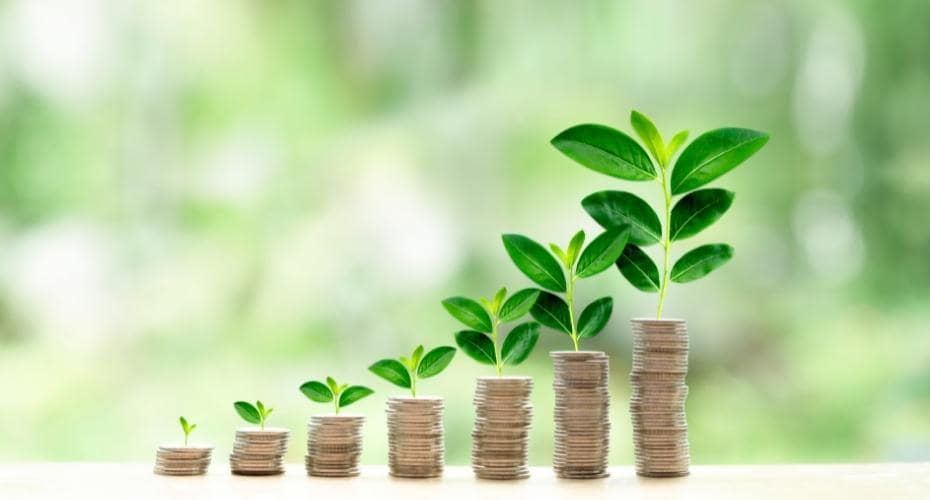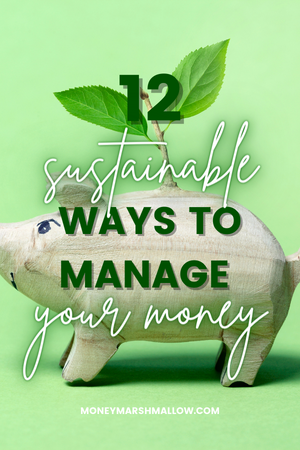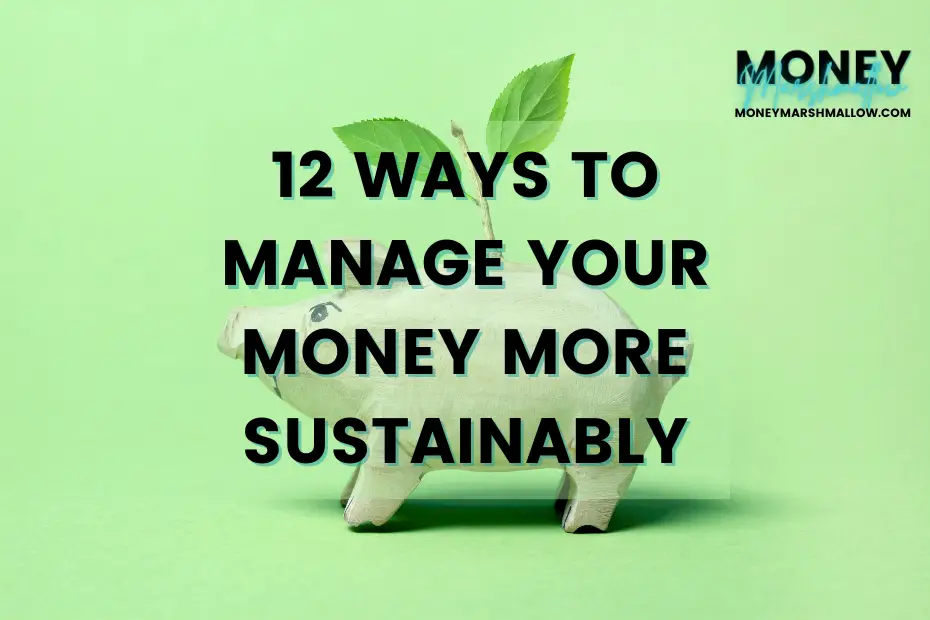Did you know that your financial choices can fund or fight important environmental and ethical matters, such as climate change? Let’s discover some ways you can make sustainable decisions for your money.
Are sustainable options more expensive?
Sustainable decisions don’t have to be detrimental to your finances – quite the opposite. From saving and investing to spending and making money, there are plenty of ways you can improve your personal finances while doing good for the environment.
Choosing to live more sustainably often means taking small steps such as adjusting your commute or being more mindful of your consumption habits. Even if you’re not quite ready to embrace sustainable practices in all areas of your life, making even small changes to how and where you spend and invest your money can go a long way towards making a difference and reducing your carbon footprint.

Sustainable ways to make money
Have some extra time on your hands that you might want to put toward helping the environment? Consider finding an environmentally friendly side hustle. Here are a couple of examples of eco-friendly ways to make money.
1. Sell your unused items
According to Clothes Aid, 350,000 tonnes, that’s around £140 million worth of used but still, wearable clothing goes to landfill in the UK every year. What’s more, Britons send over 50% of reusable furniture to landfills every year.
Next time you’re looking to clear up space in your home or wardrobe, don’t bin your unused items just yet. Instead, you can make money by selling them online or in your local community. Platforms such as Facebook Marketplace or Gumtree are great for selling locally – often buyers come to pick up the items from your home, causing no extra effort for you!
And if you prefer a broader reach, you could also sell your secondhand clothes and accessories through apps such as Depop or Vinted.
2. Start an upcycling business
Apart from selling second-hand items, you could also try making money out of upcycled items. You can upcycle and repurpose anything from an old ladder into bookshelves, old jeans into a bag, or even old tyres into jewellery. Only your imagination is the limit!
Once you’ve created your upcycled collection, you can then put them up for sale in online shops such as Etsy, Amazon Handmade, Depop, or Not on the High Street.
3. Start a green business
Got the entrepreneurship bug? Now is the best time to get started on your sustainable living start-up or other green business.
The Global Sustainability Study 2021 reveals that 85% of consumers have become ‘greener’ in their purchasing in recent years. In addition, more than a third of consumers are willing to pay more for sustainability.
Undoubtedly, this presents an opportunity to supply the ever-increasing demand for sustainable alternatives to everyday products. It could be as simple as selling shampoo and conditioner bars, bamboo toothbrushes, steel straws and other plastic-free alternatives.
Or if selling items doesn’t suit your fancy, there are other ways to make money with a green business too. You may also offer tips and advice on how to live sustainably on YouTube, blog or social media and eventually make a business of it. Depending on your interest, you could start an account with tips on green travel, green fashion or anything in between.

4. Work for a green company
One major way to make money while helping the environment is to work for a green company. With a little research, you can discover lots of companies out there committed to environmental sustainability.
Whether it’s a nonprofit advocacy organization like Greenpeace or a for-profit corporation like Tesla, there are plenty of companies dedicated to sustainable matters.
Furthermore, companies whose primary business practices may not be altogether sustainable or eco-friendly sometimes operate corporate social responsibility programs focused on green initiatives. However, be mindful of greenwashing!
Sustainable spending habits
When it comes to your spending and living habits, the biggest thing you can do for your wallet and the environment is to consume less. But of course, you have to buy some things.
Some common eco-friendly ways to save money are limiting energy consumption and reducing food and plastic waste, to name a few. Alongside these, here are some additional tips for sustainable consumer habits.
5. Switch to green energy
Limiting your energy consumption is an obvious way to both save money and the planet. But it is also possible to buy renewable energy from mainstream providers through green energy deals. These deals only supply electricity generated by wind or solar power. In the UK, renewable energy sources make up around 43% of the total electricity generation.
Also, small changes to your utility set-up can make a difference, from installing smart meters to opting for paperless billing.
6. Choose responsible retailers
It’s worth noting that while sustainability has become a big business goal, it has also become a marketing tool.
Many companies have done small changes, such as more sustainable product lines, but not all of them are fully committed to the radical changes that are needed in how they do business. It’s often difficult to spot this as a consumer.
When shopping, try to do your own research in advance; aim to make the best decision based on your budget and the most sustainable options available.
7. Repair and repurpose
To get the most for your money and lighten the impact on the environment, buy products that can be upgraded, repaired and repurposed. This helps you to get full use of them for a longer time.
A wide range of products, including complicated electrical and electronic products such as home computers and batteries, can either be upgraded or reused. All products and packages contain materials and energy that went into making them. They will go to waste if you dispose of them or even recycle them too early.
Look for opportunities to repair rather than replace. Get those creative juices flowing and find ways to repurpose products and packages for brand-new use.

8. Travel smarter
In the UK, transport is the biggest individual cause of greenhouse gas emissions with 27% of all emissions coming from this sector. Of all the domestic transport emissions, 38% are caused by international aviation. So when thinking about how to reduce our individual carbon footprints, one of the simplest ways to cut back on emissions is to fly less often.
But for those who want to see the world, there are ways to make trips more sustainable, including where you go, what you pack and how you decide to get there. In addition, here are some more tips on saving money while travelling sustainably:
- Pack light
- Stay longer at each destination
- Choose green or locally-owned accommodation
- Try housesitting
- Choose local restaurants
- Choose public transportation over car rental
Sustainable ways to save and invest
9. Buy green bonds
If you are interested in sustainable long-term savings, bonds can be a good option for you. Green Savings Bonds are a product for savers who want to invest in environmental projects chosen by the government.
UK savers can buy the bonds from National Savings & Investment (NS&I). NS&I is a savings bank that is backed by the Treasury, so your money is fully protected if things go wrong.
With green savings bonds, your money will be invested to help finance the government’s projects aiming to tackle climate change. The projects will include areas such as:
- Making transport greener
- Using renewable energy over fossil fuels
- Using energy more efficiently
- Protecting natural resources
10. Invest in ESG/SRI funds or green enterprises
While investing is important for our long-term financial health, not all investors consider its impact on environmental health.
But fortunately, sustainable and responsible investing has started gaining traction in recent years. This is known as environmental, social and governance (ESG) investing or socially responsible investing (SRI). Essentially, it’s the practice of investing money in companies and funds that have positive environmental or social impacts.
Responsible and sustainable investments can be made into individual companies with good social value, or through socially conscious mutual funds or exchange-traded funds (ETFs).
However, be cautious when looking into ESG/SRI investing. Some companies might claim to be involved in a green initiative, but only allocate minimal cash toward the cause — what’s known as greenwashing.
Allot time researching companies that are devoted to clean energy or eco-friendly business practices, for example. As with any other venture, financial literacy and patience are the keys to a fruitful investment.

11. Switch to an ethical pension
Research shows that in the UK, shifting to a more sustainable pension fund would save 19 tonnes of carbon for the average Brit. Believe it or not, it’s 21 times more effective than giving up flying, going veggie and switching energy providers.
It’s generally wise to pay into a workplace pension scheme as you benefit from employer contributions alongside government tax relief. However, most employees are paying into the default fund choices, without actively considering other options. Some workplace schemes however offer some flexibility. So you can move away from your provider’s default fund and try and find a more sustainable option.
Other sustainable ways to manage your money
12. Choose a green bank
It can be easy to forget that where we keep our money has consequences beyond our own saving potential. Banks use our money to make more money for themselves by investing it. Therefore, large chunks of our money are funnelled into practices that can be harmful to the environment.
However, ethical banks avoid investing in environmentally harmful or otherwise unethical industries. Some even take a step further by investing their money to make a positive impact on the planet and society. There are a couple of these banks in the UK.
For example, Triodos is an ethical bank that invests in a wide array of green businesses from eco-tourism to organic farming. Even its debit card is made using recyclable plant-based materials!
13. Choose a green mortgage
In addition to choosing a greener bank account, there are also more sustainable options for other financial products, such as mortgages. In fact, homes account for more than a fifth of the UK’s total CO2 emissions so green mortgages could be a game-changer for moving to a sustainable future.
A green mortgage rewards someone for buying or owning an energy-efficient home. That typically means either getting a slightly lower interest rate, or cashback when you take out the mortgage or both.
In addition, some lenders offer existing mortgage customers additional borrowing at discounted rates to pay for green home improvements such as replacing draughty windows, upgrading an outdated heating system or adding solar panels.
Sustaining your finances
In addition to changing your consumption habits, you can also think through different ways your money can impact the environment. The actions outlined above may be just the tip of the iceberg. But there are plenty of ways you can make an impact by spending, investing and banking in an environmentally conscious way.

